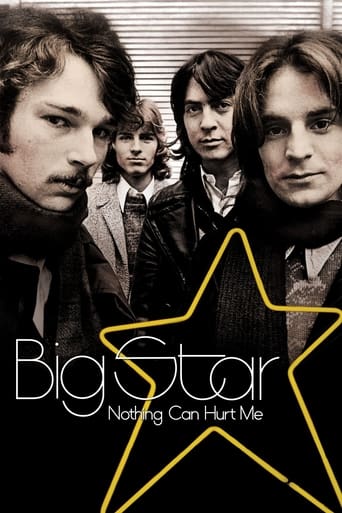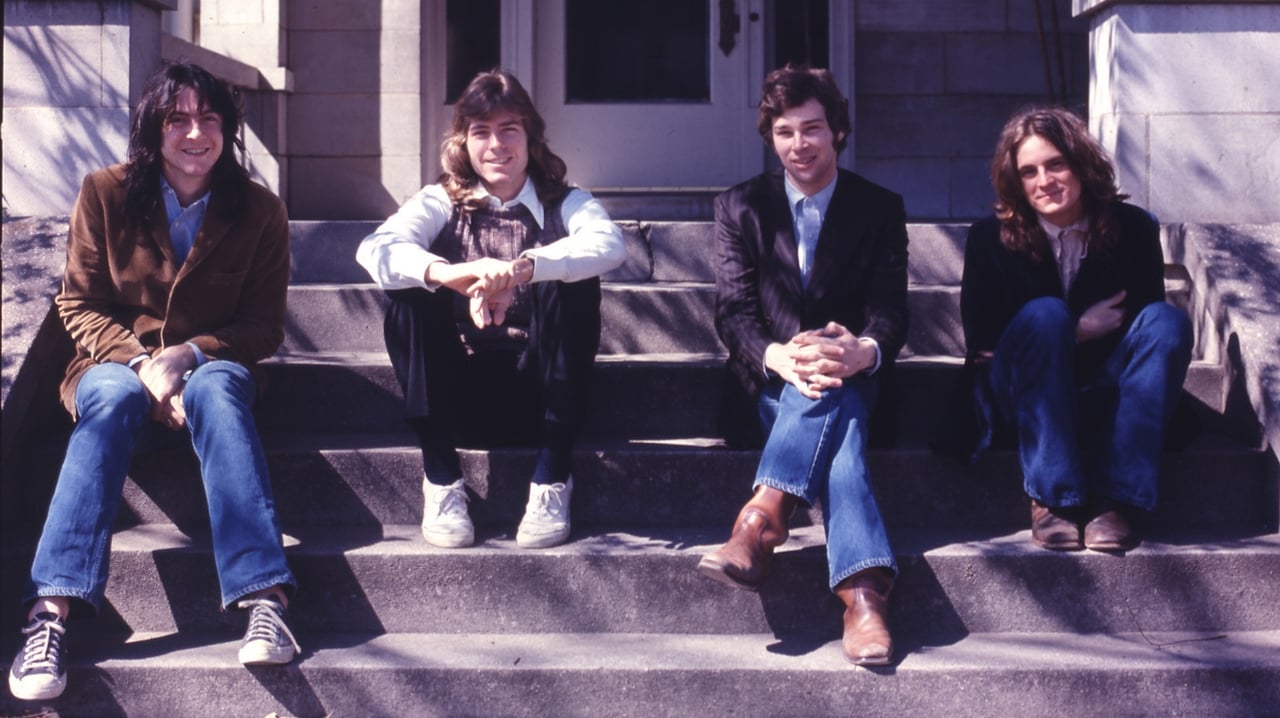polsixe
It seems too much effort to fake a documentary of an unknown band, the old photos, current video, how did they age the actors or de-age them? The music clips and documentary style seem pure HBO/cable it just seems to be an overly serious parody, but there's no humour. Who's heard of this band, it's all so meta it's either brilliant or ridiculous.
T-Rex1
Being a voracious consumer of rock music during the 1970's and having a pretty good grip on the major and minor players of the era, unfortunately I have to say that "Big Star" just wasn't very good. And I also remember the opinions of rock critics were usually out of sync with what most people were buying records of and tickets to see back then, so it should come as no surprise that they would try to spin some superlative filled sleep inducing documentary to fulfill their need to show us all how wrong we were. Sorry critics, it still goes right over your little heads. This is a condescending little foray into what was a fantastic decade of music, in spite of whether the critics approved or not.
marylois-788-910304
I went into the theater expecting a rock-n-roll documentary about a group I'd never heard of. I agree with many of the reviewers here that the film starts slowly and appears to want to convince me that this extraordinary ensemble just didn't get the break they needed. The point was pounded home time and again but, not being an big fan of rock-n-roll I felt the need of more evidence, until the story began to break about the individuals in the band and the emotional content of their work together and their lives. It was as if they all--with the exception of Chris Bell--assumed they'd get what they deserved, and too bad if that was less than it might be. Here is where the story begins to become intriguing, but the payoff is not complete.I am the same age as the Beatles, roughly, and bought their albums and the mythology that went along with them. I admit I didn't know much more about rock-n-roll than that. If you'd ask me what the band who produced "The Letter" was I would probably have said The Monkees. In fact, the lead singer on that number was Alex Chilton, who became the central member of Big Star.In the q-and-a after the showing of BIG STAR, the director revealed that much of the angst endured by Chris Bell had to do with homosexuality, and there is an area of silence around this facet his life when you are interviewing his family and remaining friends. The nugget of information would be crucial to the narrative of the band and explain to a degree why the film didn't fully work for me. I could tell Bell was difficult, tormented, and probably a genius--but what his demons were, and what his relationship with Chilton was, was not even hinted at. He seemed petulant and jealous that Chilton became the star of the group, but the level of disillusion, betrayal and pain didn't seem to come from anywhere.The film made me think; it informed me of much I didn't know about the Memphis scene and rock-n-roll in the 70s, when I was off into folk and then into old-time pop music and jazz. I parted company with the mainstream but not to the degree Big Time did. Nevertheless it is interesting to learn about their path. Now that I know there is a great deal more to their story, I would love to hear that as well.
David Ferguson
Greetings again from the darkness. The best filmmakers can be described as visual storytellers. However, what can we expect from a film if the story has no real climax or even a definitive ending? Well if the story is early 70's band Big Star and if the filmmakers are co-directors Drew DeNicola and Olivia Mori, and Producer Danielle McCarthy, the answer is an incredibly interesting and enthralling tale of how sometimes the universe just doesn't line up the way it should.Mythical stories involve such things as unicorns and the lost city of Atlantis. It's tempting, though incorrect, to label Big Star as the mythical great band of the 1970's. In fact, they were all too real. For the past 40 years, their influence has worked its way through the musical world and is obvious in the works of such bands as R.E.M. and The Replacements ... just as the influence of The Beatles, The Byrds, The Kinks and more can be heard in the songs of Big Star. The mystery and confounding question is why did the beautiful music of Big Star never "make it" to the big time like those others? This documentary is a technical and structural and visual and auditory marvel. It captures and holds our attention just like any other well made historical drama would. A doc on The Rolling Stones or Bruce Springsteen would revel in the big time success achieved or the legendary live performances or recording sessions. Instead, with Big Star, we get a much more personal look at the creative genius of its two leaders: Chris Bell and Alex Chilton. They are described as flashing comets passing in the sky. Their all too brief time together produced something special that, still to this day, deserves to be heard. Their tragic personal stories need to be told. This film does both things very well. A large part of the Big Star catalog is heard throughout, and the abundance of meaningful interviews paints a clear picture of the band and its members.One would be challenged to name any artist or creative endeavor that has been more critically acclaimed, yet commercially unsuccessful as Big Star. It absolutely makes no sense ... except for the cursory explanation given to the record labels: Ardent Records and Stax Records, and their ultimate failure in gaining retail distribution and radio airtime. Could it really be as simple as horrendous business execution? At this point, none of it really matters. The real interest ... the real story ... is the personal insight provided by lone surviving band member Jody Stephens, record producers John Fry (Ardent founder) and Jim Dickinson, and of course, the brother and sister of Chris Bell. If you are asking yourself why you have never heard any music by a band that occupies 3 slots in Roling Stones' 500 Greatest Albums of all time, I encourage you to seek out the songs ... or pay attention the next time you are watching the opening of "That 70's Show". Yes, that is Cheap Trick doing a cover of a Big Star song. There is much to be gained from seeing this documentary and discovering Big Star ... even all these years later.


 AD
AD
